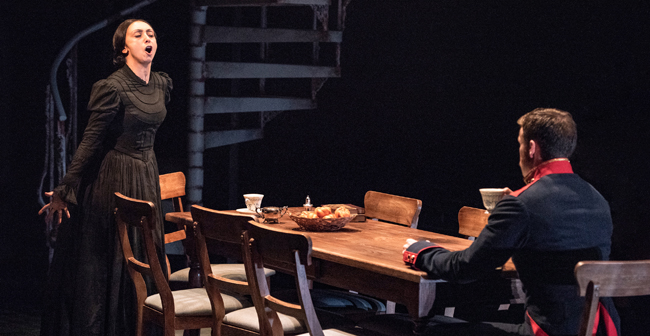Culture
 Photo: Margot Schulman
Photo: Margot Schulman
Signature Theatre Stirs Actors and Audiences with Passion
September 1, 2018 @ 12:00am
While an iconic work in the pantheon of Stephen Sondheim’s contributions to musical theatre, Passion is admittedly not an airy, feel-good musical. The hour-and-50-minute, one-act play asks much of its actors and its audiences as it tells the timeless story of wavering between the love of two different people.
The new production, at Signature Theatre through September 23, is staged to mirror a runway. The audience will be split down the middle, facing one another while absorbing the characters’ anguish as they’re torn between multiple outcomes throughout the play.
The musical, which made its debut in 1994 and holds the title of shortest-running show to win a Tony Award for Best Musical, is based on the recounting of an Italian author’s affair with an ailing woman while he served in the military. Giorgio (Claybourne Elder) swings from a dangerous pendulum between his carefully arranged relationship with his beautiful – and married – mistress Clara (Steffanie Leigh) and the allure of the reclusive, plain Fosca (Natascia Diaz).
Signature Theatre Associate Artistic Director Matthew Gardiner brings an intimacy and fierce intensity to the production, challenging audiences to face themselves and their perceptions of physical beauty. Every decision feels very deliberate, from splitting the stage in half to emphasize Giorgio’s gravitation toward both women to the unmoving lens on his transformation over the course of the play as the actor never once leaves the stage.
“It’s very dynamic,” says Diaz (West Side Story, Threepenny Opera) of the play’s staging. “It already denotes one side and another – and being pulled in multiple directions. That is the dynamic. Giorgio is being pulled between these two women. It visually exists in a physical format that enhances that energy. Matthew is able to make things that are tangible and real, but it has this ethereal quality to it.”
At first blush, the intricacies of the story may seem dated. A sickly, homely Fosca isolates herself from her surroundings and lives vicariously through books. Giorgio takes a military post far away from his beautiful Clara, but the lovers stay connected through impassioned letters. Though Passion is set in the 19th century, the painful missteps of romance and navigating the concept of monogamy are still very much familiar to us in 2018. As Elder (Sunday in the Park with George, Bonnie and Clyde) prepared for his role, he too found the subject matter relatable.
“The novel was written in 1870 and as I read it, I thought to myself, ‘What a fascinating mediation on love and obsession, affection and passion,’” Elder says. “I’ve definitely found myself in the novel – like, ‘I have done that before, I have felt that way about a person before’ – which is very interesting. The feelings behind it all are every bit as contemporary as they would have been in the 1800s.”
Fosca is widely regarded as one of the most unlikeable characters in modern theatre, making it a complex role for any actor. But much like Elder, Diaz looked past the surface and found common ground with the young woman, physical and emotional afflictions and all. While preparing to take on what she called the largest role she’s ever played, Diaz says she grew to feel as though she knew Fosca.
“I looked at the page and thought, ‘I could have written this,’ meaning that I understand her completely. I not only understand her, but I love her. It’s the strangest thing to play a character as large and as previously judged as this. It’s just like any other slander case. They don’t know her until they’ve read it and seen what’s at the center of her soul.”
The polarizing nature of Fosca lies not as much in her physical unattractiveness as it does in the fact that she embodies “pure, unadulterated feeling.” At the heart of the play, though, is Giorgio’s struggle between two women, two ways of life, his head and his heart.
The audience’s disdain for Fosca may be the initial visceral reaction, but the production holds another element that makes Giorgio’s role equally if not more so emotionally taxing. As the common thread that binds every character in Passion together, it makes sense to have Elder remain onstage for the entire performance – though the impressive feat does have its own physical and emotional challenges for the actor.
“What Giorgio learns in this play is astonishing and very profound,” Elder says. “I connect to it greatly and I find it very emotional, and therefore it’s hard. As actors, it costs something emotionally every time you do a play. You give a piece of yourself to it. I’m grateful this run is only a few months, because living in this for a long time would be very challenging. I would need a lot of therapy. It challenges me to really face myself.”
For audiences who are ready to experience a production that asks questions both timeless and timely, Signature is ready to take you on a journey in their intimate, inventive black-box space. You may learn something about yourself right alongside Giorgio.
“Passion is not a show that gets done very often in regional theatre, because it’s not a big draw,” he continues. “It’s complicated, it’s emotional, it’s dark at times. It’s not a laugh-a-minute night out, so you need an audience that’s going to get excited and support it. I have absolutely no doubt that [Signature] is the best possible place to do this show. I feel very, very lucky to get to be a part of this.”
Stephen Sondheim’s Passion runs through September 23 at Signature Theatre. Tickets are $40-$104. Pride Night is September 7, Discussion Night is September 12 and Open Captioning will be held on September 16. Learn more at www.sigtheatre.org.
Signature Theatre: 4200 Campbell Ave. Arlington, VA; 703-820-9771; www.sigtheatre.org








